What Are Reishi Mushrooms?
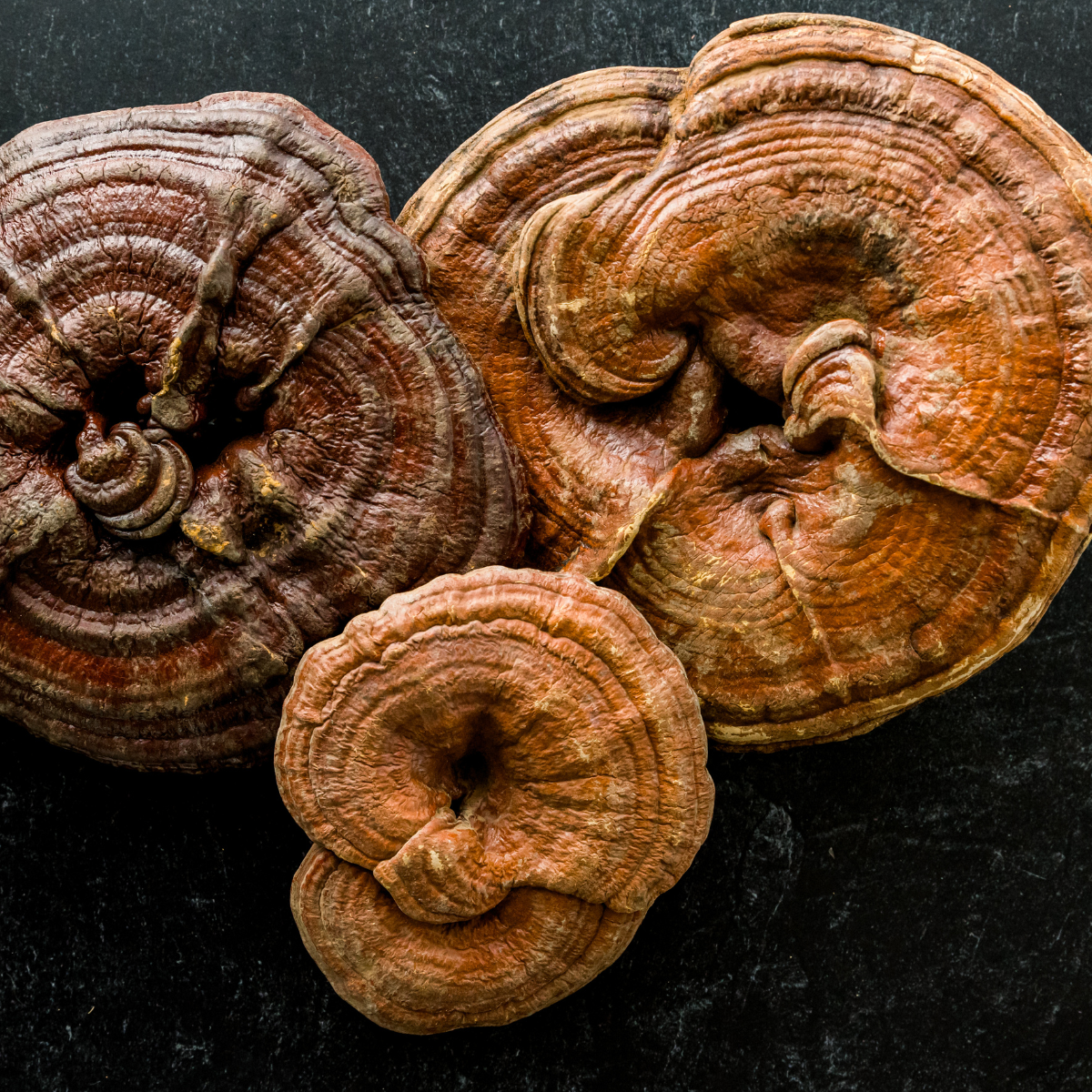
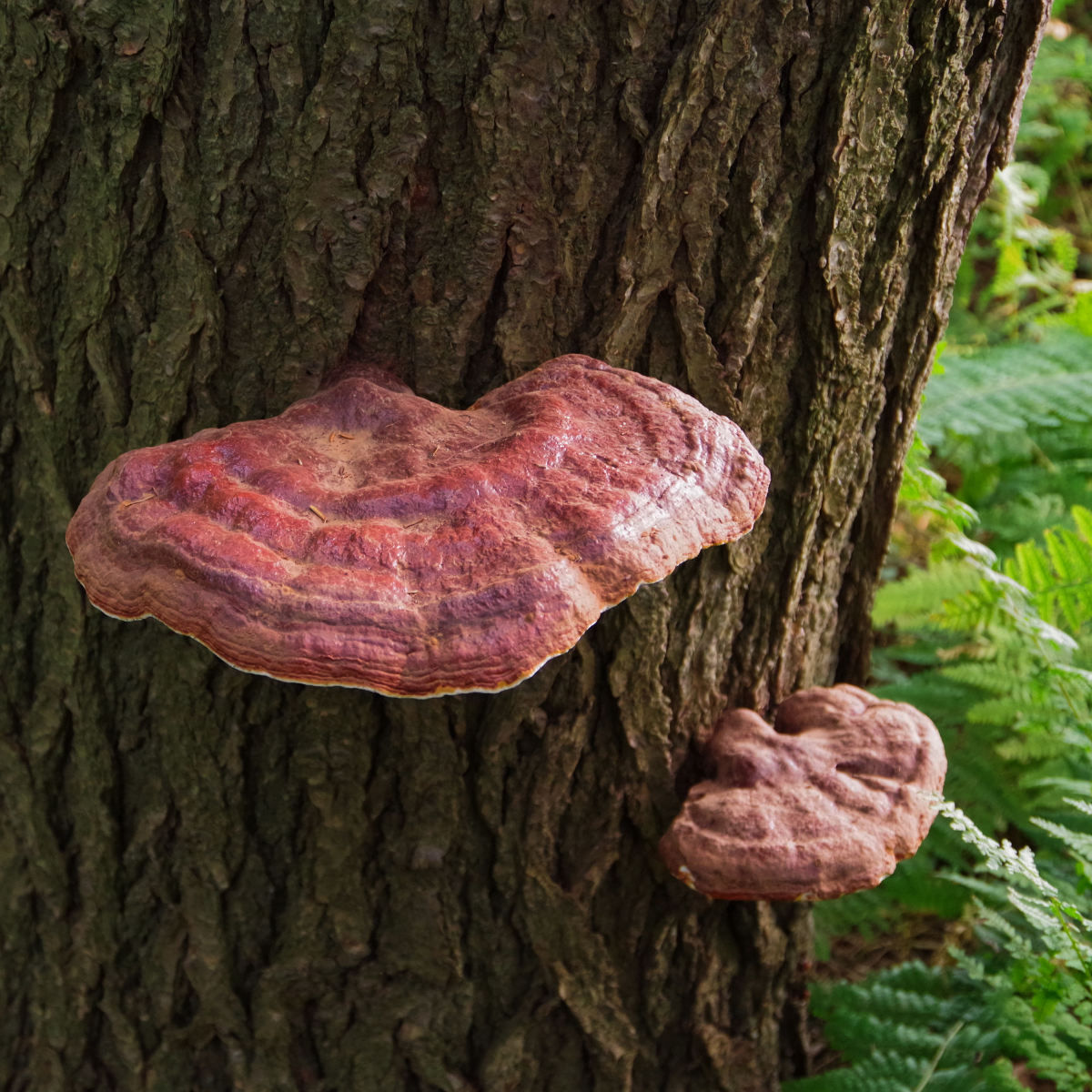
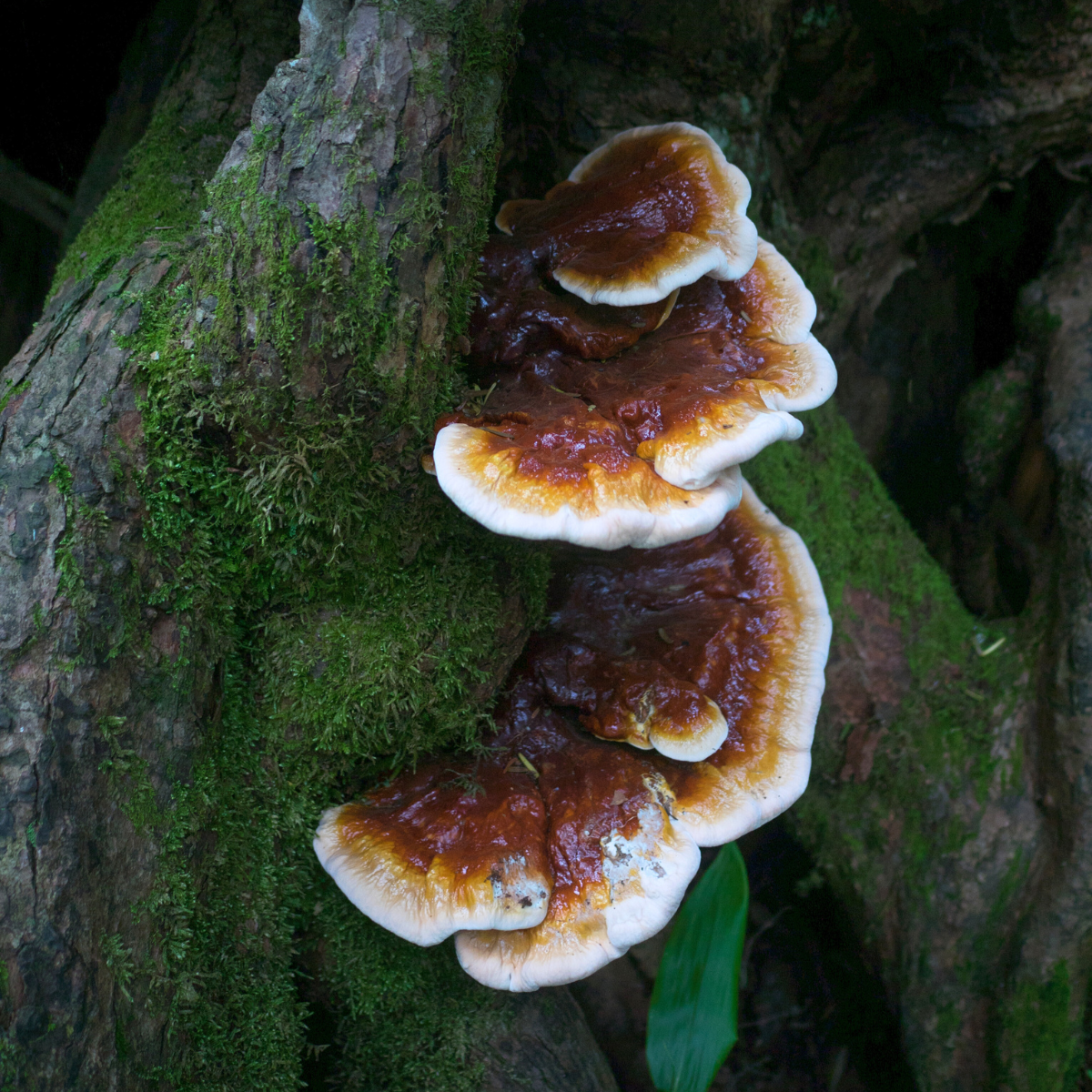
Reishi mushrooms, also known as Lingzhi mushrooms, are a type of fungus belonging to the species Ganoderma lucidum. They have been highly regarded in Traditional Chinese Medicine for thousands of years and are believed to offer various health benefits. Reishi mushrooms have a unique appearance with a shiny, reddish-brown cap and a woody texture. They are commonly found growing on decaying logs and tree stumps.
The history of Reishi mushrooms stretches back thousands of years and is deeply rooted in traditional Asian medicine and culture. Reishi mushrooms have been revered in China, Japan, Korea, and other Asian countries for their purported health benefits and as a symbol of longevity and vitality.
The use of Reishi mushrooms can be traced back to ancient China, where they were first mentioned in texts dating as far back as the Han dynasty (206 BCE - 220 CE). These early texts, including the "Shennong Ben Cao Jing" (The Divine Farmer's Materia Medica), one of the oldest Chinese medical texts, describe the health-promoting properties of various herbs and fungi, including Reishi.
Reishi mushrooms were initially rare and found mainly in the wild, making them highly prized and reserved for emperors and nobility. They were considered to be a potent elixir of life and were often associated with immortality and spiritual enlightenment. In traditional Chinese culture, Reishi mushrooms were known as "lingzhi," which means "spiritual potency" or "immortality fungus."
Today, Reishi mushrooms are consumed in various forms, including extracts, powders, capsules, and teas, and they are available in health food stores and as dietary supplements worldwide. While they remain an essential part of traditional Asian medicine, they have also gained popularity in Western countries as interest in natural remedies and herbal supplements continues to grow.
Featured Fungi
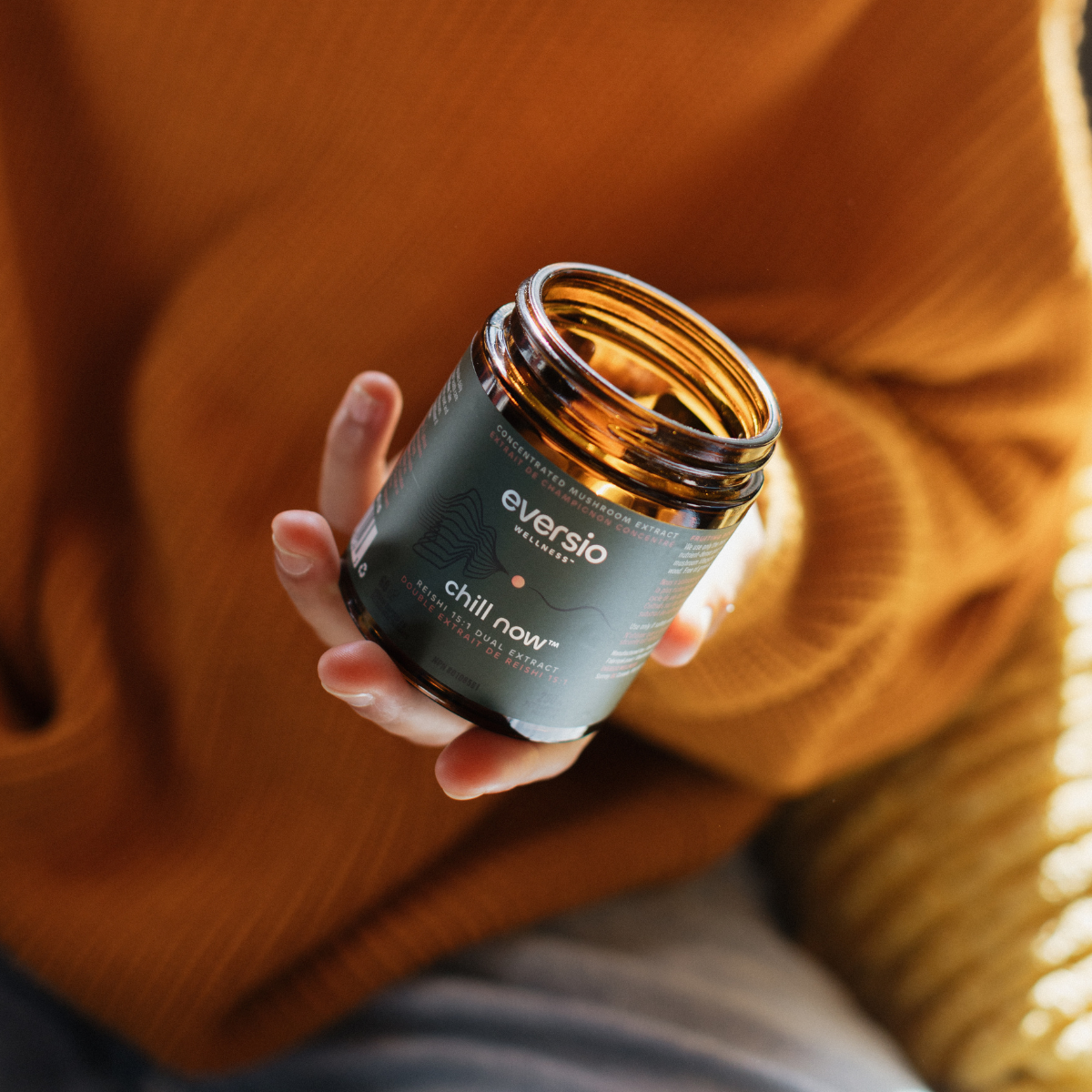

The Benefits Of Reishi
The health-promoting properties of Reishi mushrooms are attributed to their bioactive compounds, which include polysaccharides, triterpenoids, and peptidoglycans. In Traditional Chinese Medicine, Reishi mushrooms are used to support the immune system, promote longevity, and enhance overall well-being.

Functional mushrooms, such as Reishi, have recently been labeled as natural biological response modifiers (BRMs) because they have the ability to alter immune responses in the body [1]. They also fit into the category of adaptogens because of how they are able to help the body adapt to stress.

Reishi mushrooms possess beta-glucans, polysaccharides, and triterpenes known for their ability to support the immune system by activating immune cells like macrophages and natural killer cells. Additionally, these compounds promote the generation of cytokines, crucial for regulating immune responses. Research has showcased the immunomodulatory properties of Reishi mushrooms in diverse groups [2,3].

Reishi works by stimulating the activity of macrophages, specialized cells in our bodies responsible for detecting and eliminating harmful bacteria and organisms. Macrophages possess specific receptors for beta-glucans like dectin-1 and TLR-2 [4]. Among these receptors, dectin-1 is the most abundant and its activation triggers processes that lead to the elimination of invading pathogenic microorganisms [4]. Toll-like receptors (TLRs) are another group of common immune system receptors that play a crucial role in initiating the innate immune response during the early stages of infection.

When beta-glucans bind to TLRs, they activate the innate immune system and prompt the production of important cytokines that help control the growth and activity of other immune cells [4]. This interaction between beta-glucans and immune cells is significant as it showcases Reishi's potential to support a healthy immune system.
Functional mushrooms, such as Reishi, have recently been labeled as natural biological response modifiers (BRMs) because they have the ability to alter immune responses in the body [1]. They also fit into the category of adaptogens because of how they are able to help the body adapt to stress.
Reishi mushrooms possess beta-glucans, polysaccharides, and triterpenes known for their ability to support the immune system by activating immune cells like macrophages and natural killer cells. Additionally, these compounds promote the generation of cytokines, crucial for regulating immune responses. Research has showcased the immunomodulatory properties of Reishi mushrooms in diverse groups [2,3].
Reishi works by stimulating the activity of macrophages, specialized cells in our bodies responsible for detecting and eliminating harmful bacteria and organisms. Macrophages possess specific receptors for beta-glucans like dectin-1 and TLR-2 [4]. Among these receptors, dectin-1 is the most abundant and its activation triggers processes that lead to the elimination of invading pathogenic microorganisms [4]. Toll-like receptors (TLRs) are another group of common immune system receptors that play a crucial role in initiating the innate immune response during the early stages of infection.
When beta-glucans bind to TLRs, they activate the innate immune system and prompt the production of important cytokines that help control the growth and activity of other immune cells [4]. This interaction between beta-glucans and immune cells is significant as it showcases Reishi's potential to support a healthy immune system.





EVERSIO WELLNESS
Functional mushrooms are powerful on their own, but when combined, they create a synergy that amplifies their benefits, known as the entourage effect." This natural phenomenon occurs when the diverse bioactive compounds found in different mushroom species work together, enhancing each other's effects and supporting overall wellness more effectively than any single mushroom could alone.
Whether it's strengthening immunity, improving cognitive function, or enhancing energy levels, the combined power of these mushrooms provides a more balanced and potent impact on your health, helping you achieve holistic well-being.
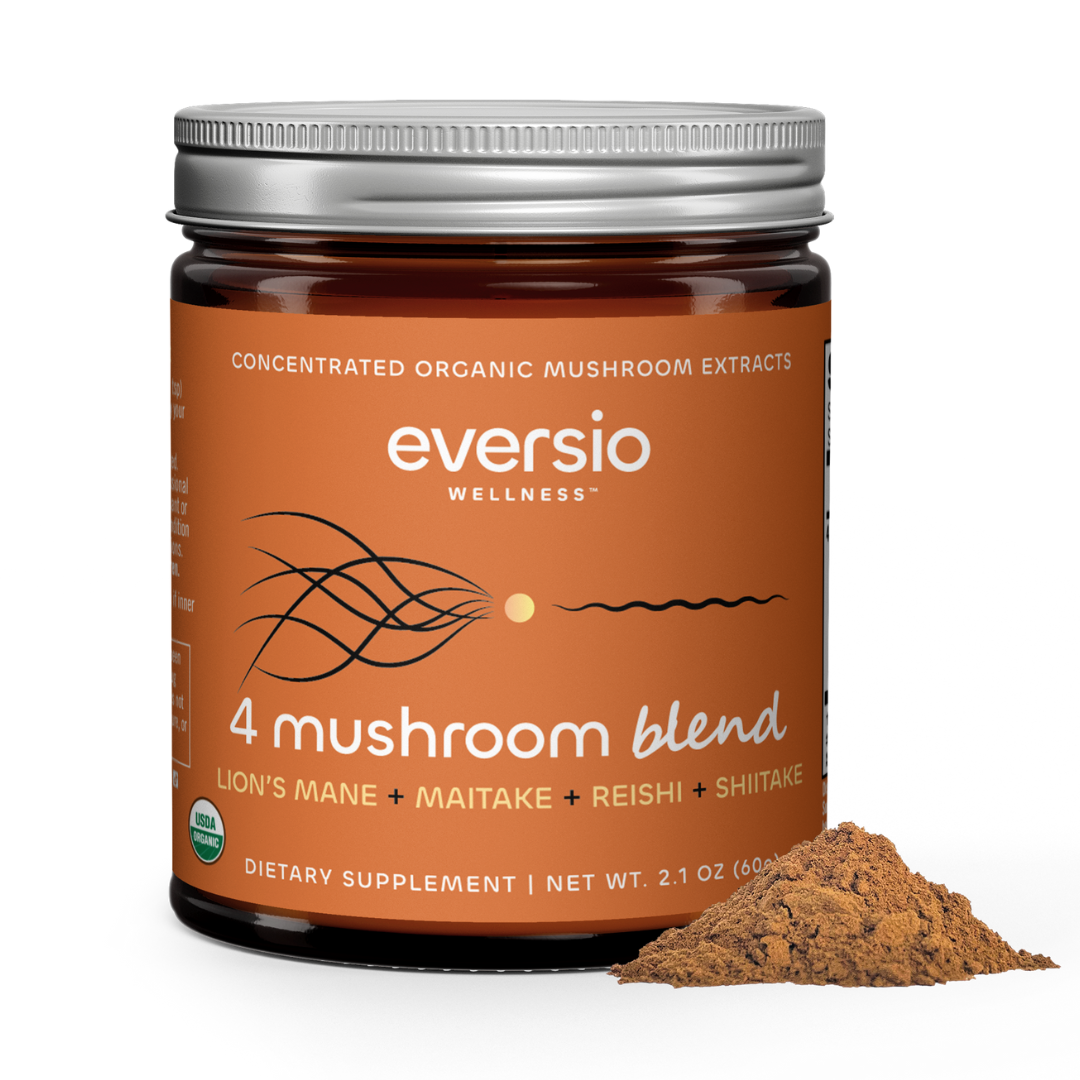

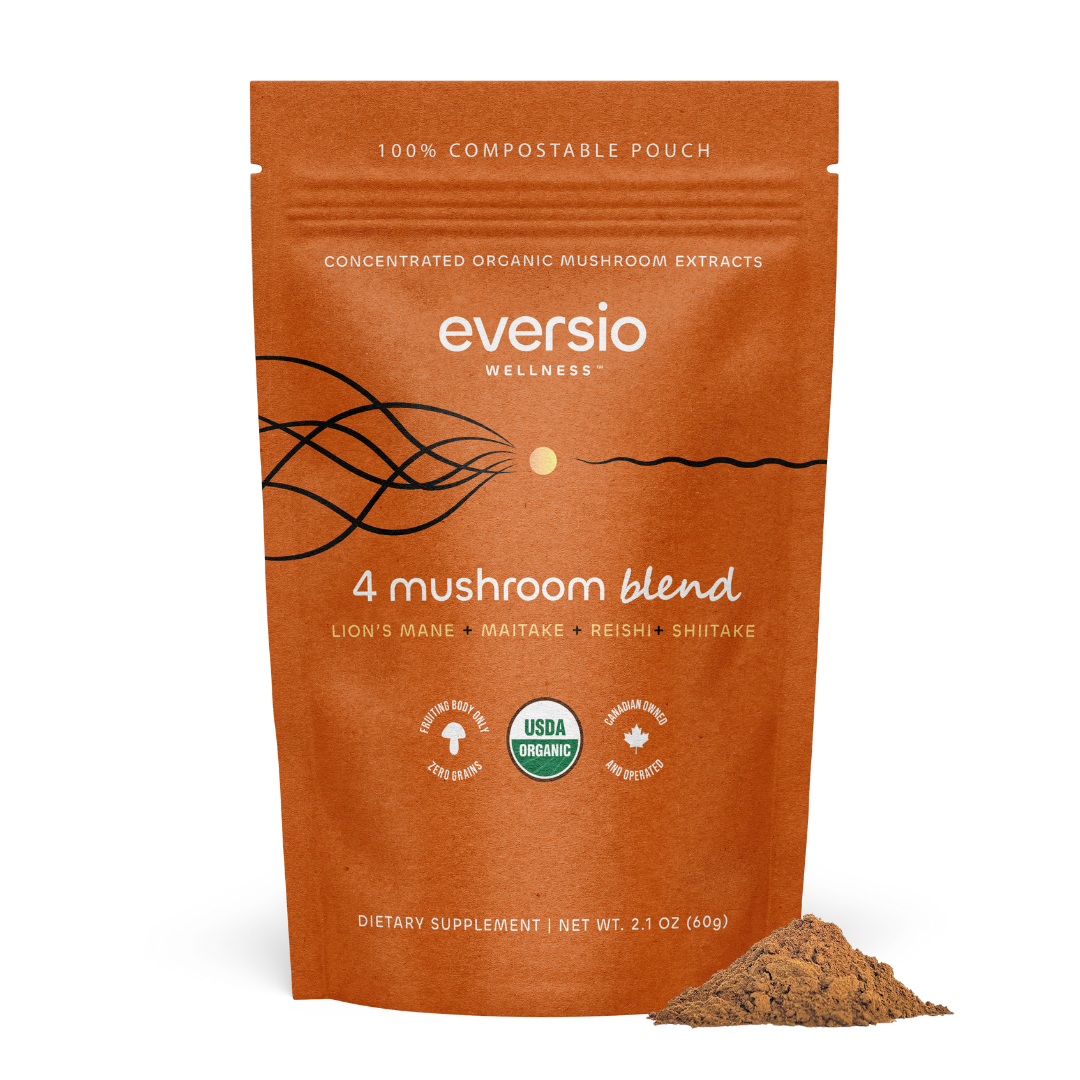
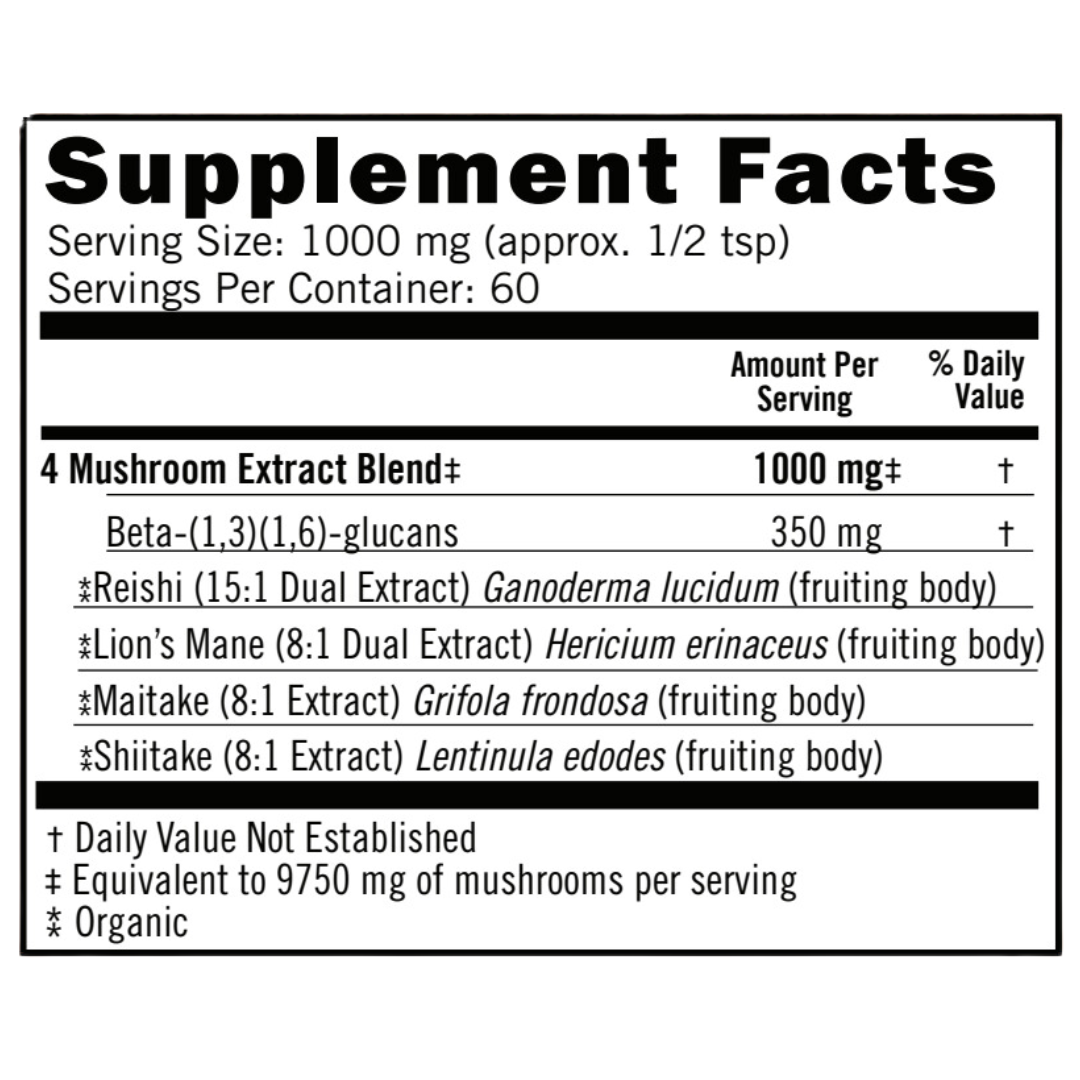


Optimize Your Health and Wellness with Powerful Antioxidant Support from Our Four Mushroom Blend
Mother Nature knows we all need balance to feel our best. We need to be busy and committed to our purpose, and then we need time to rest and reset.
That’s where our 4 Mushroom Blend (The Balance Blend) comes in to save the day by offering a high antioxidant combination of our mushroom extracts designed to address the effects of too much fight or flight.*
Add just ½ tsp (1000mg) of this high-potency mushroom extract blend to the drink or recipe of your choice for a beneficial dose of Reishi 15:1 Dual Extract + Lion's Mane 8:1 Dual Extract + Maitake 8:1 Extract + Shiitake 8:1 Extract.
This mushroom extract blend can be used to settle the mind, support sleep, relieve occasional stress, promote relaxation, and maintain well-being. Align with Mother Nature’s rhythms and let Eversio Wellness mushroom supplements bring you back into BALANCE.
The Fungi Fineprint
The sections below provide valuable insights into functional mushrooms' benefits, safety, research, and practical use. These notes help you better understand how these powerful natural ingredients can support your health and well-being. Whether you're new to functional mushrooms or looking to deepen your knowledge, you'll find helpful information right here to guide your wellness journey.
Benefits Summarized
Reishi mushrooms offer a range of mind and body benefits:
Mind:
Stress Reduction: Reishi mushrooms have adaptogenic properties, helping the body manage stress and promoting relaxation.
Improved Sleep: They can enhance sleep quality by calming the nervous system.
Cognitive Support: Reishi was used in traditional practices to boost mental clarity and focus, supporting overall brain health.
Body:
Immune Support: Reishi mushrooms strengthen the immune system, helping the body fight off infections.
Energy Support: Regular consumption of reishi mushrooms can increase energy levels and combat fatigue.
These benefits make reishi mushrooms a popular choice for holistic health and well-being.
Health & Safety
Reishi mushrooms have a long history of use in Traditional Chinese Medicine and are generally considered safe for most people when consumed as part of a balanced diet or as a dietary supplement. The potential health benefits of Reishi mushrooms stem from their bioactive compounds, such as polysaccharides and triterpenoids, which exhibit immunomodulating and antioxidant properties. As with any supplement or herbal remedy, it is essential to exercise caution and consult with a health care professional, especially if you have any pre-existing health conditions or are taking medications.
Additionally, some individuals may experience mild side effects, such as
digestive discomfort or allergic reactions, although these are relatively rare.
Pregnant or breastfeeding women and individuals with autoimmune diseases should exercise particular caution when considering the use of Reishi mushrooms.
Overall, while Reishi mushrooms show promise in supporting health, responsible use and professional advice are recommended to ensure safety and optimize potential benefits.
Research & References
[1] Mirończuk-Chodakowska I, Kujawowicz K, Witkowska AM. Beta-Glucans from Fungi: Biological and Health-Promoting Potential in the COVID-19 Pandemic Era. Nutrients. 2021 Nov 6;13(11):3960. doi: 10.3390/nu13113960. PMID: 34836215; PMCID: PMC8623785.
[2] Lin, Z. B., & Zhang, H. N. (2004). Anti-tumor and immunoregulatory activities of Ganoderma lucidum and its possible mechanisms. Acta Pharmacologica Sinica, 25(11), 1387-1395.
[3] Wang, S. Y., Hsu, M. L., Hsu, H. C., Lee, S. S., Shiao, M. S., & Ho, C. K. (1997). The anti-tumor effects of Ganoderma lucidum (Curt.: Fr.) P. Karst. (Ling Zhi, Reishi mushroom) (Aphyllophoromycetideae) polysaccharides are related to tumor necrosis factor-α and interferon-γ. Cryptogamie, Mycologie, 18(3), 191-195.
[4] Mirończuk-Chodakowska I, Kujawowicz K, Witkowska AM. Beta-Glucans from Fungi: Biological and Health-Promoting Potential in the COVID-19 Pandemic Era. Nutrients. 2021 Nov 6;13(11):3960. doi: 10.3390/nu13113960. PMID: 34836215; PMCID: PMC8623785.
[5] Cör Andrejč D, Knez Ž, Knez Marevci M. Antioxidant, antibacterial, antitumor, antifungal, antiviral, anti-inflammatory, and nevro-protective activity of Ganoderma lucidum: An overview. Front Pharmacol. 2022 Jul 22;13:934982. doi: 10.3389/fphar.2022.934982. PMID: 35935849; PMCID: PMC9353308.
[6] Zhu Q, Bang TH, Ohnuki K, Sawai T, Sawai K, Shimizu K. Inhibition
of neuraminidase by Ganoderma triterpenoids and implications for euraminidase inhibitor design. Sci Rep. 2015 Aug 26;5:13194. doi: 10.1038/srep13194. PMID: 26307417; PMCID: PMC4549708.
[7] Guggenheim AG, Wright KM, Zwickey HL. Immune Modulation From Five Major Mushrooms: Application to Integrative Oncology. Integr Med (Encinitas). 2014 Feb;13(1):32-44. PMID: 26770080; PMCID: PMC4684115.
[8] Mizutani N, Nabe T, Shimazu M, Yoshino S, Kohno S. Effect of Ganoderma lucidum on pollen-induced biphasic nasal blockage in a guinea pig model of allergic rhinitis. Phytother Res. 2012 Mar;26(3):325-32. doi: 10.1002/ptr.3557. Epub2011 Jun 23. PMID: 21698671.
[9] Hijikata Y, Yamada S, Yasuhara A. Herbal mixtures containing the
mushroom Ganoderma lucidum improve recovery time in patients with herpes
genitalis and labialis. J Altern Complement Med. 2007 Nov;13(9):985-7. doi:
10.1089/acm.2006.6297. PMID: 18047445.
[10] Ahmad MF, Ahmad FA, Khan MI, Alsayegh AA, Wahab S, Alam
MI, Ahmed F. Ganoderma lucidum: A potential source to surmount viral infections through β-glucans immunomodulatory and triterpenoids antiviral properties. Int J Biol Macromol. 2021 Sep 30;187:769-779. doi: 10.1016/j.ijbiomac.2021.06.122. Epub 2021 Jun 29. PMID: 34197853.
[11] Eo SK, Kim YS, Lee CK, Han SS. Antiherpetic activities of various protein bound polysaccharides isolated from Ganoderma lucidum. J Ethnopharmacol. 1999 Dec 15;68(1-3):175-81. doi: 10.1016/s0378-8741(99)00086-0. PMID: 10624876.
[12] Lee YJ, Han SB, Nam SY, Oh KW, Hong JT Inflammation and Alzheimer's
disease. Arch Pharm Res. 2010 Oct;33(10):1539-56. doi: 10.1007/s12272-010-1006-7. Epub 2010 Oct 30. PMID: 21052932.
[13] Barnham KJ, Masters CL, Bush AI. Neurodegenerative diseases and oxidative stress. Nat Rev Drug Discov. 2004 Mar;3(3):205-14. doi: 10.1038/nrd1330. PMID: 15031734.
[14] Sun XZ, Liao Y, Li W, Guo LM. Neuroprotective effects of ganoderma lucidum polysaccharides against oxidative stress-induced neuronal apoptosis. Neural Regen Res. 2017 Jun;12(6):953-958. doi: 10.4103/1673-5374.208590. PMID: 28761429; PMCID: PMC5514871.
[15] Farina MP, Kim JK, Hayward MD, Crimmins EM. Links between inflammation and immune functioning with cognitive status among older Americans in the Health and Retirement Study. Brain Behav Immun Health. 2022 Nov 13;26:100559. doi: 10.1016/j.bbih.2022.100559. PMID: 36439057; PMCID: PMC9694056.
[16] Tello I, Campos-Pena V, Montiel E, Rodriguez V, Aguirre-Moreno A, Leon-Rivera I, Del Rio-Portilla F, Herrera-Ruiz M, Villeda-Hernandez J. Anticonvulsant
and neuroprotective effects of oligosaccharides from Lingzhi or Reishi medicinal mushroom, Ganoderma lucidum (Higher Basidiomycetes). Int J Med
Mushrooms. 2013;15(6):555-68. doi: 10.1615/intjmedmushr.v15.i6.40. PMID: 24266379.
[17] Wang GH, Li X, Cao WH, Li J, Wang LH. A retrospective study of Ganoderma Lucidum Spore Powder for patients with epilepsy. Medicine (Baltimore). 2018 Jun;97(23):e10941. doi: 10.1097/MD.0000000000010941. PMID: 29879039; PMCID: PMC5999473.
[18] Wang SQ, Li XJ, Qiu HB, Jiang ZM, Simon M, Ma XR, Liu L, Liu JX, Wang FF, Liang YF, Wu JM, Di WH, Zhou S. Anti-epileptic effect of Ganoderma lucidum polysaccharides by inhibition of intracellular calcium accumulation and stimulation of expression of CaMKII α in epileptic hippocampal neurons. PLoS One. 2014 Jul 10;9(7):e102161. doi: 10.1371/journal.pone.0102161. Erratum in: PLoS One. 2014;9(10):e111295. PMID: 25010576; PMCID: PMC4092074.
[19] Yao C, Wang Z, Jiang H, Yan R, Huang Q, Wang Y, Xie H, Zou Y, Yu Y, Lv L. Ganoderma lucidum promotes sleep through a gut microbiota-dependent and serotonin-involved pathway in mice. Sci Rep. 2021 Jul 1;11(1):13660. doi:
10.1038/s41598-021-92913-6. PMID: 34211003; PMCID: PMC8249598.
[20] Cui XY, Cui SY, Zhang J, Wang ZJ, Yu B, Sheng ZF, Zhang XQ, Zhang YH. Extract of Ganoderma lucidum prolongs sleep time in rats. Ethnopharmacol. 2012 Feb 15;139(3):796-800. doi: 10.1016/j.jep.2011.12.020. Epub 2011 Dec 21. PMID: 22207209.
Additional Research
[21] Magnus W, Nazir S, Anilkumar AC, et al. Attention Deficit Hyperactivity Disorder. [Updated 2022 Aug 15]. In: StatPearls [Internet]. Treasure Island (FL): StatPearls Publishing; 2022 Jan-. Available from: https://www.ncbi.nlm.nih.gov/books/NBK441838/
[22] Yao C, Wang Z, Jiang H, Yan R, Huang Q, Wang Y, Xie H, Zou Y, Yu Y, Lv L. Ganoderma lucidum promotes sleep through a gut microbiota-dependent and serotonin-involved pathway in mice. Sci Rep. 2021 Jul 1;11(1):13660. doi:
10.1038/s41598-021-92913-6. PMID: 34211003; PMCID: PMC8249598.
[23] Becker SP. ADHD and sleep: recent advances and future directions. Curr Opin Psychol. 2020 Aug;34:50-56. doi: 10.1016/j.copsyc.2019.09.006. Epub 2019 Sep 20. PMID: 31629217; PMCID: PMC7082190.
[24] Riglin L, Leppert B, Dardani C, Thapar AK, Rice F, O'Donovan MC, Davey Smith G, Stergiakouli E, Tilling K, Thapar A. ADHD and depression:
investigating a causal explanation. Psychol Med. 2021 Aug;51(11):1890-1897.
doi: 10.1017/S0033291720000665. Epub 2020 Apr 6. PMID: 32249726; PMCID:
PMC8381237.
[25] Li H, Xiao Y, Han L, Jia Y, Luo S, Zhang D, Zhang L, Wu P, Xiao C, Kan W, Du J, Bao H. Ganoderma lucidum polysaccharides ameliorated depression-like behaviors in the chronic social defeat stress depression model via modulation of Dectin-1 and the innate immune system. Brain Res Bull. 2021 Jun;171:16-24. doi: 10.1016/j.brainresbull.2021.03.002. Epub 2021 Mar 8. PMID: 33705858.
[26] Matsuzaki H, Shimizu Y, Iwata N, Kamiuchi S, Suzuki F, Iizuka H, Hibino Y, Okazaki M. Antidepressant-like effects of a water-soluble extract from the culture medium of Ganoderma lucidum mycelia in rats. BMC Complement Altern Med. 2013 Dec 26;13:370. doi: 10.1186/1472-6882-13-370. PMID: 24369991; PMCID: PMC3879659.
[27] Nakamura Y, Kitamura Y, Sumiyoshi Y, Naito N, Kan S, Ushio S, Miyazaki I, Asanuma M, Sendo T. Involvement of 5-HT2A receptor hyperfunction in the anxiety-like behavior induced by doxorubicin and cyclophosphamide combination treatment in rats. J Pharmacol Sci. 2018 Nov;138(3):192-197. doi: 10.1016/j.jphs.2018.10.001. Epub 2018 Oct 9. PMID: 30360947.
[28] Yin Z, Yang B, Ren H. Preventive and Therapeutic Effect of Ganoderma (Lingzhi) on Skin Diseases and Care. Adv Exp Med Biol. 2019;1182:311-321. doi: 10.1007/978-981-32-9421-9_14. PMID: 31777026.
[29] Bertino L, Guarneri F, Cannavò SP, Casciaro M, Pioggia G, Gangemi S. Oxidative Stress and Atopic Dermatitis. Antioxidants (Basel). 2020 Feb 26;9(3):196. doi: 10.3390/antiox9030196. PMID: 32111015; PMCID: PMC7139929.
[30] Grant P, Ramasamy S. An update on plant derived anti-androgens. Int J Endocrinol Metab. 2012 Spring;10(2):497-502. doi: 10.5812/ijem.3644. Epub 2012 Apr 20. PMID: 23843810; PMCID: PMC3693613.
[31] Shimizu, K., Miyamoto, I., Liu, J. et al. Estrogen-like activity of ethanol extract of Ganoderma lucidum. J Wood Sci 55, 53–59 (2009). https://doi.org/10.1007/s10086-008-0992-2
[32] Vargas KG, Milic J, Zaciragic A, Wen KX, Jaspers L, Nano J, Dhana K, Bramer WM, Kraja B, van Beeck E, Ikram MA, Muka T, Franco OH. The functions of estrogen receptor beta in the female brain: A systematic review. Maturitas. 2016 Nov;93:41-57. doi: 10.1016/j.maturitas.2016.05.014. Epub 2016 Jun 4. PMID: 27338976.
[33] Anuar AM, Minami A, Matsushita H, Ogino K, Fujita K, Nakao H, Kimura S, Sabaratnam V, Umehara K, Kurebayashi Y, Takahashi T, Kanazawa H, Wakatsuki A, Suzuki T, Takeuchi H. Ameliorating Effect of the Edible Mushroom Hericium erinaceus on Depressive-Like Behavior in Ovariectomized Rats. Biol Pharm Bull. 2022;45(10):1438-1443. doi: 10.1248/bpb.b22-00151. PMID: 36184501.
[34] Agarwal A, Rana M, Qiu E, AlBunni H, Bui AD, Henkel R. Role of oxidative
stress, infection and inflammation in male infertility. Andrologia. 2018 Dec;50(11):e13126. doi: 10.1111/and.13126. PMID: 30569652.
[35] Li Y, Liang W, Han Y, Zhao W, Wang S, Qin C. Triterpenoids and Polysaccharides from Ganoderma lucidum Improve the Histomorphology and Function of Testes in Middle-Aged Male Mice by Alleviating Oxidative Stress and Cellular Apoptosis. Nutrients. 2022 Nov 9;14(22):4733. doi: 0.3390/nu14224733. PMID: 36432421; PMCID: PMC9696538.
[36] Feng X, Wang Y. Anti-inflammatory, anti-nociceptive and sedative-hypnotic activities of lucidone D extracted from Ganoderma lucidum. Cell Mol Biol (Noisy-le-grand). 2019 Apr 30;65(4):37-42. PMID: 31078150.
[37] Lam FF, Ko IW, Ng ES, Tam LS, Leung PC, Li EK. Analgesic and anti-arthritic effects of Lingzhi and San Miao San supplementation in a rat model of arthritis induced by Freund's complete adjuvant. J Ethnopharmacol. 2008 Oct
30;120(1):44-50. doi: 10.1016/j.jep.2008.07.028. Epub 2008 Jul 30. PMID:
18708134.
[38] Soares AA, de Sá-Nakanishi AB, Bracht A, da Costa SM, Koehnlein EA, de Souza CG, Peralta RM. Hepatoprotective effects of mushrooms. Molecules. 2013 Jul 1;18(7):7609-30. doi: 10.3390/molecules18077609. PMID: 23884116; PMCID: PMC6270077.
[39] Rahman MA, Abdullah N, Aminudin N. Evaluation of the Antioxidative and Hypo-cholesterolemic Effects of Lingzhi or Reishi Medicinal Mushroom, Ganoderma lucidum (Agaricomycetes), in Ameliorating Cardiovascular
Disease. Int J Med Mushrooms. 2018;20(10):961-969. doi: 10.1615/IntJMedMushrooms.2018028370. PMID: 30806268.
Where To Buy
In the vast market of functional mushrooms, it becomes imperative to prioritize awareness of the product's composition to ensure the utmost potency. At Eversio Wellness, our commitment lies in offering exclusively 100% fruiting body mushroom extracts, maintaining a transparent approach towards consumers by providing Certificates of Analysis (COAs) for each product. These COAs serve as a reassurance, scientifically confirming the claimed percentages of beneficial constituents through meticulous lab testing. Furthermore, the COAs also verify the absence of heavy metals and microbial contaminants, assuring customers of receiving the finest mushroom supplements available. There has never been a more opportune moment to explore the world of online mushroom purchases.
It is also important to ensure that your Reishi product has gone through a dual extraction process. Dual extraction combines the benefits of both hot water and alcohol extraction methods. In this approach, the mushroom material is subjected to sequential extraction using both water and alcohol solvents. This method aims to capture a wider spectrum of bioactive compounds present in mushrooms, including both water-soluble and alcohol-soluble components. Dual extraction is often preferred when targeting a comprehensive range of beneficial compounds and maximizing the potential health benefits of the mushroom extract.
CONNECT WITH US!
Your Journey Starts Here
Connect with our mushroom wellness community on Instagram! Discover the benefits of functional mushrooms, share your experiences, and engage with like-minded enthusiasts. Let's grow together in our journey towards better health and well-being through the power of mushrooms.
EVERSIO WELLNESS
Join the Eversio community and receive 10% off your first order!
Be the first to know about new offers, great recipes, and mushroom news! You will receive a 10% off discount code to use on your first order as soon as you sign up!
Premium Quality Mushroom Extracts
Eversio means change. Our mission is to change lives through fungi. We intend to do that by offering the best functional mushroom supplements available today.
Eversio Wellness products deliver the benefits of functional mushrooms with premium-grade fruiting body extract products that are vegan, created in a Canadian GMP Certified facility, USDA Organic Certified, non-GMO, third party lab tested, and super concentrated. Each capsule or ½ tsp of our extract blends delivers a FULL BENEFICIAL DOSE in line with current research.






